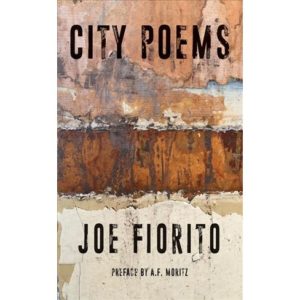
Interview by Jennifer Amos
Photo Credit Richard Lautens, Toronto Star
Joe Fiorito recently launched his first collection of poetry, City Poems. His ability to zero in on the heart of a story and his compassion are some of the hallmarks of his fiction and non-fiction writing, which continue to shine through in his poetry — with dazzling results.
In City Poems, we revisit some familiar people from your Toronto Star columns (Al Gosling, Janos Buda, Fred Dunn and his Ode to Joy, Dirty George, as a few examples). What was it like for you write about them again? And what do you find the poetic form allows for that is different from non-fiction?
Some of the people I wrote about in my newspaper column are permanently etched in my memory. I can’t shake them, and I don’t want to. But whereas the column was generous in length, and straightforward in form, I’ve returned to the original material in a way which is more elliptical, allusive, and structured with stops and starts, much like the way we speak.
There are always new truths to find, and the shorter form is more powerful. I have always been a minimalist. I find great joy in using 40 words to say what I used to say in 800 words.
I think of the columns as windows; in the poems I have smashed them and used the glass fragments in a new way, to refract light, or sometimes to slice open a perception and show something shocking.
You begin with a quote by another Toronto poet, Raymond Souster (1921-2012): “because not even the landlady / could remember their names,” from the poem, “The Fire in the Tenement” which appeared in Ten Elephants on Yonge Street. Can you tell me a bit about this choice?
Souster was important to me when I was learning my craft; he wrote small, closely observed poems based on city life, and I took many cues from his work; specifically, reading him helped me learn that the material of art is right in front of us, present in what we see and who we meet in daily life. I met him once, when I was young and my work was at an impasse; he encouraged me, and I owe him a debt.
The quote is Souster damning us for not paying attention; it was my job a journalist, and it is my obligation as a poet, to pay attention to those who might otherwise be forgotten.
It seems that your work is often focused on people who are just hanging on (and sometimes not), within the circumstances they find themselves. Why is it important for you to tell the stories of these people? How do you hope readers will respond?
Life is generally difficult, and we don’t have much time, so we find it easy to ignore or turn away from the struggles of those around us. But those people are who we are, and we’re all in this together. The principle, from Terence of Rome: “Nothing human is alien to me”
The City of Toronto a lmost feels like one of the characters in your writing. In Union Station (2006) you wrote, “Torontonians don’t really know this city because it changes every day. It’s not a finished thing, it’s a work in progress,” and in your final column (2016), you said, “Toronto is a hard place to like, just as it is an easy place to love.” Can you tell me a bit about your relationship with your city? Have your feelings changed along with the city over the years?
lmost feels like one of the characters in your writing. In Union Station (2006) you wrote, “Torontonians don’t really know this city because it changes every day. It’s not a finished thing, it’s a work in progress,” and in your final column (2016), you said, “Toronto is a hard place to like, just as it is an easy place to love.” Can you tell me a bit about your relationship with your city? Have your feelings changed along with the city over the years?
A thesis: Toronto draws the best and the brightest, as well as the outcasts and the misfits, from all around the country; that leaves a sadness in the small towns of Canada; our families and our friends miss us. By the same token, we all miss our hometowns, and the people we grew up with. So in many ways, Toronto is a pool of sadness and longing; true also in our many immigrant communities.
This is also a city full of strivers who are struggling to find and keep their place, and this gets harder all the time; it’s exhausting.
I am happy here, but it is an uneasy happiness, because the human cost of staying afloat is very high. I see many people flounder, and many others who make bad bargains for the sake of money.
I am by nature an observer, and so I try to stay fairly neutral in order to see clearly what’s in front of me; that means there’s always a bit of distance in my relationship with the city. However, I am not neutral about cruelty or stupidity, of which we have our share.
But like all Torontonians, I am happy in my neighbourhood. Have I changed? My love of place has grown more keen, and my suspicions have deepened, over time.
Your work resonates with people who know Toronto, and also with those who don’t. In your experience, do these two audiences come to your work differently?
I think the reaction to my work naturally differs, but in subtle ways, from “That must be how it is there,” to “Oh, this is exactly how it is here.” It is the difference between feeling something, and seeing it first-hand. But in the end, the things I write about are pretty universal: life, death, love, anger, bad breaks and good ones, the things that happen to us all.
You retired from The Star in 2016 and have since collaborated with Richard Atkinson on his memoir and published City Poems. How is life different now from when you were on the beat?
I wrote three columns a week for more than 20 years; that’s maybe 100,000 words a year, the size of a generous novel. I had no idea how hard it was until I stopped doing it. I now find that the freedom to work at my own pace is a great luxury, even if the work is not exactly easier.
You’ve written in a number of forms, for example: columns, a novel, non-fiction collections, memoir. What’s next for you?
As for the various forms, I also spent a long time writing for radio; I was a CBC current affairs producer, and that’s where I really learned how to write vividly and concisely, and also how to write on a deadline.
Next up? I have a second book of poetry in the works, and plans for more. The masochist in me wonders about another novel. I also have the notion that some of my stories might work as a one-man show, on stage; stay tuned.
Joe Fiorito is a journalist and author who worked for CBC Radio in Iqaluit and Regina. He was a city columnist for the Montreal Gazette, The Globe & Mail, The National Post and the Toronto Star newspapers. He won the National Newspaper Award for Columns in 1995, the Brassani Prize for Short Fiction in 2000, and the City of Toronto Book Award in 2003. He is the author of eight books, including his newly released collection of poetry, City Poems. He lives with his wife in Toronto.
Jennifer Amos is a writer currently based in Kingston, Ontario. Her work has appeared in The New Quarterly and Room Magazine, and has been longlisted for the CBC short story prize and shortlisted for Room’s Annual Fiction Contest.